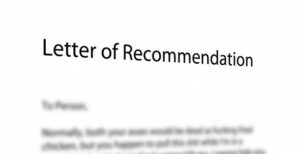Letters of recommendation are an important part of every application package. Some employers request them with the application and resume, while others want them only after a successful interview. You should take the time early in your job search to think about who will be the best recommendations for a particular job.
While most people feel honored to be asked to write a letter of recommendation, it is possible to ask someone who refuses. Do not allow yourself to stop and dwell on the refusal. Move on and ask someone else. Keep the references timely. Try to get letters from people you have known and with whom you have worked in the past five (maybe ten) years.
Most people ask for a letter of recommendation in one of these situations:
- They need a letter of recommendation for college admission or internship
- They are looking for a job and need a letter created for a specific position
- They are leaving a job and they are requesting letters in anticipation of a job search
The tips that follow will help you in either situation.
Content is Critical
A good letter of recommendation will outline why the person writing the letter believes you will be well suited for a specific new job. It needs to say a little bit more than just that the writer thinks you are a reasonably good person and capable of doing a good job in a generic position. By providing some information to the individual, you can be assured of a more powerful letter of recommendation. Be prepared to provide the following:
- A copy of the job posting or the job description
- A list of key strengths, experiences and skills sought for the job
- A list of your abilities and skills, as well as some examples of how you have used them successfully in the past, particularly during the time the person has worked with you.
- Examples of how your leadership skills had a positive effect
- Comments on how you get along with other people, such as peers, supervisors, subordinates, and how you function as part of a team
- Your core values and goals, how attentive to details you are, etc.
It is also a good idea to send the person writing your letter a copy of your current resume and a summary of recent accomplishments s/he might not know about. If you are asked to write the letter and provide it for the person’s signature, you should avoid the temptation.
Keep in mind that hiring managers frequently contact people who write letters with additional questions. Experienced HR people can spot the fakes immediately.
Choose the Right People
The common choices for people to write letters of recommendation are:
- Current or former employers, supervisors
- Colleagues (peers – not subordinates) who have worked with you regularly
- Professors of recent graduates who taught courses in your major
Be sure the people you ask for letters know you as a professional or as a student. Unless you are specifically asked for character references, you don’t need them.
If you are graduating from school or leaving a job, and you had a good relationship with your professor or supervisor, asking for a general letter two or three weeks before your departure is a good idea. Your accomplishments will be fresh in their minds (which might not be the case a year later).
There can be many reasons for refusing to write a letter for someone:
- a person is not comfortable with his or her writing skills,
- she/he has never written a recommendation and does not know how,
- or the person is not really a big fan of your work.
If someone hesitates when you ask for a letter, thank them for considering your request and immediately withdraw the request. Pushing them to write a letter might produce a letter you do not want a potential employer to see.
Don’t overlook the details
Always thank someone for writing a letter of recommendation for you. This can be a way to remind someone or provide encouragement to them to get the letter done if they have neglected it.
Confirm at that time that the writer has the name and correct address of the hiring manager or other person to whom the letter should be directed.
If the letter is to be targeted to a specific job, be sure to provide a copy of the job description and/or posting and provide an addressed, stamped envelope for the letter.

